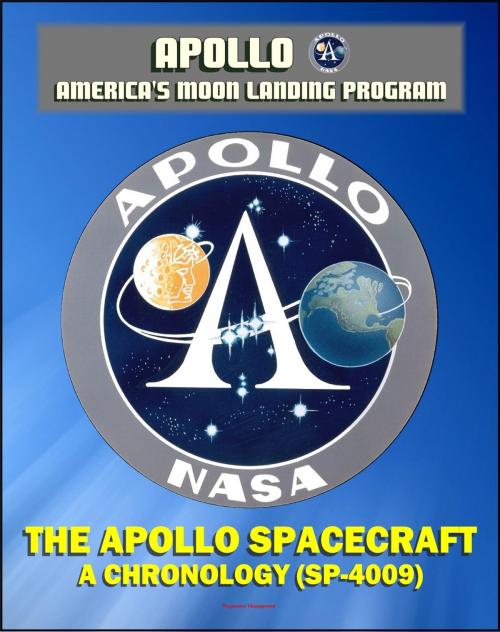Apollo and America's Moon Landing Program: The Apollo Spacecraft - A Chronology - Four Volumes (SP-4009) - Complete Official History of the Apollo Program from Inception Through 1974
Nonfiction, Science & Nature, Science, Physics, Astronomy, History, Americas| Author: | Progressive Management | ISBN: | 9781466177871 |
| Publisher: | Progressive Management | Publication: | November 10, 2011 |
| Imprint: | Smashwords Edition | Language: | English |
| Author: | Progressive Management |
| ISBN: | 9781466177871 |
| Publisher: | Progressive Management |
| Publication: | November 10, 2011 |
| Imprint: | Smashwords Edition |
| Language: | English |
This comprehensive official NASA history document - converted for accurate flowing-text e-book format reproduction - is an crucial reference to the day-by-day activities and decisions which led to the overwhelming success of the Apollo moon landing program. All four volumes of the Chronology are included in this massive conversion, which comprises over 1300 pages.
The preface to Volume 1 states: "The intent of the authors is to concentrate on the important events that have affected the concept, design, and development of the Apollo spacecraft rather than to cover in detail the entire Apollo program. In keeping with this intent, the authors have tried to give a balanced overview of the Apollo spacecraft program, not limiting the chronology to the activities of a single NASA Center. Volume 1 Part I, "Concept to Apollo," reviews the earliest years up to the official announcement of the Apollo program. Part II, "Design-Decision-Contract," continues through the selection of the principal contractor for the command and service modules. Part III, "Lunar Orbit Rendezvous: Mode and Module," completes Volume I, ending with the naming of the contractor for the lunar module. As far as possible, primary sources were consulted. These included congressional documents, Apollo program status reports, Manned Spacecraft Center and Apollo Spacecraft Project Office weekly activity reports, contractors' progress reports, Apollo working papers, letters, memoranda, NASA and industry staff reports, minutes of meetings, and interviews with persons directly involved in the early years of the Apollo program. In addition, books, newspaper accounts, press releases, chronologies, and magazine articles were researched for material."
Volume 1 covers the period through 1962; Volume 2 from 1962 to 1964; Volume 3 from 1964 to 1966; and the final volume from 1966 to 1974.
The foreword to Volume 4 reads: "The events that took place during that period included all flight tests of the Apollo spacecraft, as well as the last five Gemini flights, the AS-204 accident, the AS-204 Review Board activities, the Apollo Block II Redefinition Tasks, the manned Apollo flight program and its results, as well as further use of the Apollo spacecraft in the Skylab missions.
The manned flights of Apollo, scheduled to begin in early 1967, were delayed by the tragic accident that occurred on January 27, 1967, during a simulated countdown for mission AS-204. A fire inside the command module resulted in the deaths of the three prime crew astronauts, Virgil I. Grissom, Edward H. White II, and Roger B. Chaffee. On January 28, 1967, the Apollo 204 Review Board was established to investigate the accident. It was determined that action should be initiated to reduce the crew risk by eliminating unnecessary hazardous conditions that would imperil future missions. Therefore, on April 27, a NASA Task Team - Block II Redefinition, CSM - was established to provide input on detailed design, overall quality and reliability, test and checkout, baseline specification, configuration control, and schedules."
In this chronology, as with any collection of written communications on a given project, the negative aspects of the program, its faltering and its failures, become more apparent because these are the areas that require written communication for corrective action. However, it should be stressed that in spite of the failures, the moon was reached by traveling an unparalleled path of success for an undertaking so complex. The disastrous fire at Cape Kennedy had given the Apollo program a drastic setback. But when Apollo 7 was launched, the first manned flight in nearly two years, it was a success. Every spacecraft since that time improved in performance with the exception of the problems experienced in Apollo 13.
This comprehensive official NASA history document - converted for accurate flowing-text e-book format reproduction - is an crucial reference to the day-by-day activities and decisions which led to the overwhelming success of the Apollo moon landing program. All four volumes of the Chronology are included in this massive conversion, which comprises over 1300 pages.
The preface to Volume 1 states: "The intent of the authors is to concentrate on the important events that have affected the concept, design, and development of the Apollo spacecraft rather than to cover in detail the entire Apollo program. In keeping with this intent, the authors have tried to give a balanced overview of the Apollo spacecraft program, not limiting the chronology to the activities of a single NASA Center. Volume 1 Part I, "Concept to Apollo," reviews the earliest years up to the official announcement of the Apollo program. Part II, "Design-Decision-Contract," continues through the selection of the principal contractor for the command and service modules. Part III, "Lunar Orbit Rendezvous: Mode and Module," completes Volume I, ending with the naming of the contractor for the lunar module. As far as possible, primary sources were consulted. These included congressional documents, Apollo program status reports, Manned Spacecraft Center and Apollo Spacecraft Project Office weekly activity reports, contractors' progress reports, Apollo working papers, letters, memoranda, NASA and industry staff reports, minutes of meetings, and interviews with persons directly involved in the early years of the Apollo program. In addition, books, newspaper accounts, press releases, chronologies, and magazine articles were researched for material."
Volume 1 covers the period through 1962; Volume 2 from 1962 to 1964; Volume 3 from 1964 to 1966; and the final volume from 1966 to 1974.
The foreword to Volume 4 reads: "The events that took place during that period included all flight tests of the Apollo spacecraft, as well as the last five Gemini flights, the AS-204 accident, the AS-204 Review Board activities, the Apollo Block II Redefinition Tasks, the manned Apollo flight program and its results, as well as further use of the Apollo spacecraft in the Skylab missions.
The manned flights of Apollo, scheduled to begin in early 1967, were delayed by the tragic accident that occurred on January 27, 1967, during a simulated countdown for mission AS-204. A fire inside the command module resulted in the deaths of the three prime crew astronauts, Virgil I. Grissom, Edward H. White II, and Roger B. Chaffee. On January 28, 1967, the Apollo 204 Review Board was established to investigate the accident. It was determined that action should be initiated to reduce the crew risk by eliminating unnecessary hazardous conditions that would imperil future missions. Therefore, on April 27, a NASA Task Team - Block II Redefinition, CSM - was established to provide input on detailed design, overall quality and reliability, test and checkout, baseline specification, configuration control, and schedules."
In this chronology, as with any collection of written communications on a given project, the negative aspects of the program, its faltering and its failures, become more apparent because these are the areas that require written communication for corrective action. However, it should be stressed that in spite of the failures, the moon was reached by traveling an unparalleled path of success for an undertaking so complex. The disastrous fire at Cape Kennedy had given the Apollo program a drastic setback. But when Apollo 7 was launched, the first manned flight in nearly two years, it was a success. Every spacecraft since that time improved in performance with the exception of the problems experienced in Apollo 13.















